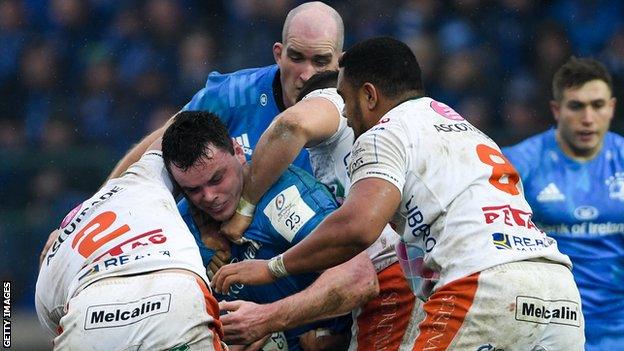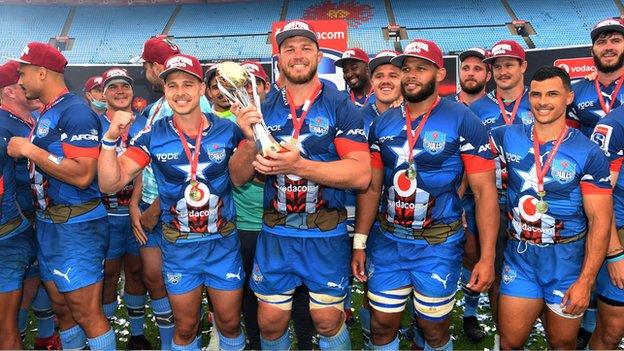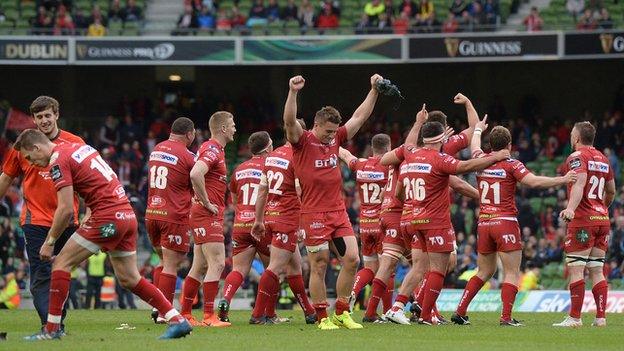Pro14 becomes United Rugby Championship as South Africa sides join tournament
- Published
- comments
The United Rugby Championship - how the revamped competition will work
The Pro14 will rebrand as the United Rugby Championship (URC) when South Africa's four teams join the competition in 2021-22.
Sharks, Stormers, Lions and Bulls will play alongside the 12 existing sides from Ireland, Italy, Scotland and Wales in a 16-team league.
There will be one division, with end of season play-offs.
"We are taking the league to new heights," said URC chief executive Martin Anayi.
"Forming the United Rugby Championship will begin to reshape the club rugby world."
The South African sides will also be eligible to qualify for European competitions from 2022-23. The four former Super Rugby sides have replaced fellow South African outfits Cheetahs and Southern Kings in the tournament.
The final agreement for the new league creates a pathway for SA Rugby to become a full shareholder in the Pro Rugby Championship (PRC DAC) alongside the Celtic and Italian unions.
The season is due to start at the end of September 2021, with each team playing 18-regular-season fixtures, while there will be a grand final in mid June.
The tournament will run for at least five seasons with league bosses stating the intention is not to change the format again.
Why the name change?
League bosses say the United Rugby Championship represents elite club rugby across two hemispheres.
With a change in format and the addition of the big-name South African sides, they believe it is the right time to change the name of the tournament, conceding using numbers in the title has not "quite worked out so well".
The aim is to produce a league with a more familiar format, no crossovers with international weekends and more teams capable of winning the title.

Leinster, in blue, won the 2020-21 Pro14 league title while Benetton will host Bulls of South Africa in the Pro14 Rainbow Cup final on Saturday
How will it work?
In comparison to the two-conference Pro14 structure, the 18-round regular season will see the return of one league table and is designed to mean fewer clashes with international weekends.
There will be 21 game weekends per season, down from a total of 24 when the tournament was previously a 12-team league.
The URC will use one league table to rank the top eight teams who will reach the knock-out stages, with teams having a minimum of nine home games in the regular season.
The top eight teams will qualify for the play-offs, with quarter-finals and semi-finals planned before a grand final.
There will be four regional pools with the quartet of Welsh regions, Irish provinces and South African sides each forming a nation-specific group, and the two Scotland and Italian sides linking up in the other.
This means local derbies will be maintained and teams will play each other at least once each season.
Each team will play home and away fixtures against their regional opponents, and 12 home or away fixtures against the remaining teams in the league.
Teams from the northern hemisphere will play two away games in South Africa each season with the aim being for these to be played back-to-back.
Teams from South Africa will play six away games in the northern hemisphere, which should require two three-game tours of Europe.

Bulls won a South Africa-only Super Rugby Unlocked tournament during the Covid-19 pandemic in 2020
Race for Europe
Eight teams will qualify each season for the following season's Heineken Champions Cup from the URC and the rest of the teams will participate in the second-tier Challenge Cup.
Subject to the finalisation of contract terms with EPCR, South African teams will be eligible to qualify for the Champions Cup from the 2022-23 season for the first time.
At least one side from each of the regional pools will qualify to play among Europe's elite.
This means there will be a guaranteed side from Wales, Ireland and South Africa in the competition, while the leading side out of Glasgow, Edinburgh, Zebre and Benetton will also qualify.
All points won during the regular season will contribute to rankings in the regional pools and the highest-ranking team in each of the four pools will earn a place in the Champions Cup for the following season.
The remaining four places will be awarded to the four highest-ranked teams from the single-standing league table who have not already qualified through the four regional pools.

Scarlets were winners of the Pro12 final in 2017
What they said
Martin Anayi, CEO of United Rugby Championship: "The United Rugby Championship will see World Cup winners, icons of the Six Nations, the Rugby Championship and stars of the British and Irish Lions tour turning up the intensity in an exciting new league format.
"The arrival of South Africa's elite teams and removal of fixtures from international match weekends will make our league stronger across the board."
South African sides 'among top 10 in world' - URC chief Martin Anayi
Jurie Roux, CEO of SA Rugby: "South African rugby has for many years imagined a future aligned with northern-hemisphere rugby and this announcement marks the arrival of that vision.
"Our teams will be pitting themselves against the leading clubs from four nations, steeped in rugby tradition and folklore. They'll do it without having to cross time zones or acclimatise while 100% of matches will kick off in South African prime time."

Sport's Strangest Crimes: What happened when wonder horse Shergar was suddenly taken?
Footballers' Favourite Foods: Can you guess what these England players' ultimate meals are?
